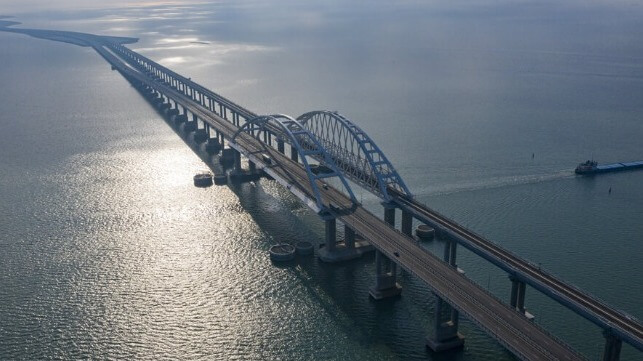Russia Stops Ships with “Explosive Residue” From Kerch Strait Transit

For the second time in less than a week, Russia’s Federal Security Service (FSB) has denied transit for a foreign ship through the Kerch Strait before the vessel’s reached the sea lane passing beneath the Crimea Bridge. The FSB is asserting that it found residues of explosives on the vessels which had previously visited Ukrainian ports.
The actions come days after the bridge was damaged for the second time in less than six months. Russian authorities blamed Ukrainian operatives for the attacks on the bridge attributing the July 17 attack to an explosives-laden drone boat.
The Turkish-owned general cargo ship BMO River departed Midia, Romania on July 21 bound for the port at Rostov-on-Don to load Russian grain. The 1,600 dwt vessel, which is 259 feet in length, is registered in Palau with its ownership reported as Inspektor Shipping of Istanbul.
Without providing details, the FSB said it inspected the ship during its voyage from Sinop, Turkey as it was making its way through the Kerch Strait. The vessel’s AIS signal shows on July 26 that it was turned around before reaching the Crimean Bridge and is currently in an anchorage in the area.
“Traces of the explosives dinitrotoluene and TNT were found in the cargo hold and on the surface of the lifeboat,” according to the FSB. They said in checking the manifests of the vessel it was also determined that it had called at the Ukrainian seaport of Reni on the Danube twice, once in June and another time in July.
“The decision was made to ban the passage of the vessel under the navigable arch,” the FSB said as part of its ongoing control and verification efforts to maintain the safety of navigation in the region. The vessel was also reportedly ordered to depart the Russian Federation’s territorial sea.

that matters most
Get the latest maritime news delivered to your inbox daily.
Four days earlier, the FSB also reported that an unidentified foreign ship was being turned away for similar reasons. On July 22, the FSB said it had found traces of the explosives dinitrotoluene and tetryl in the hold of a foreign dry cargo ship en route from Turkey to the port of Rostov-on-Don to load grain. They further asserted that there were signs of “third-party interference in the structural parts of the bulk carrier.”
Like the BMO River, the unnamed ship was reported to have called at the Ukrainian port of Kiliya at the end of May. In July, the FSB claimed that while the ship was in the Turkish port of Tuzla, the ship’s crew of 12 Ukrainians was replaced and the vessel’s name changed before the departure for Russia.
